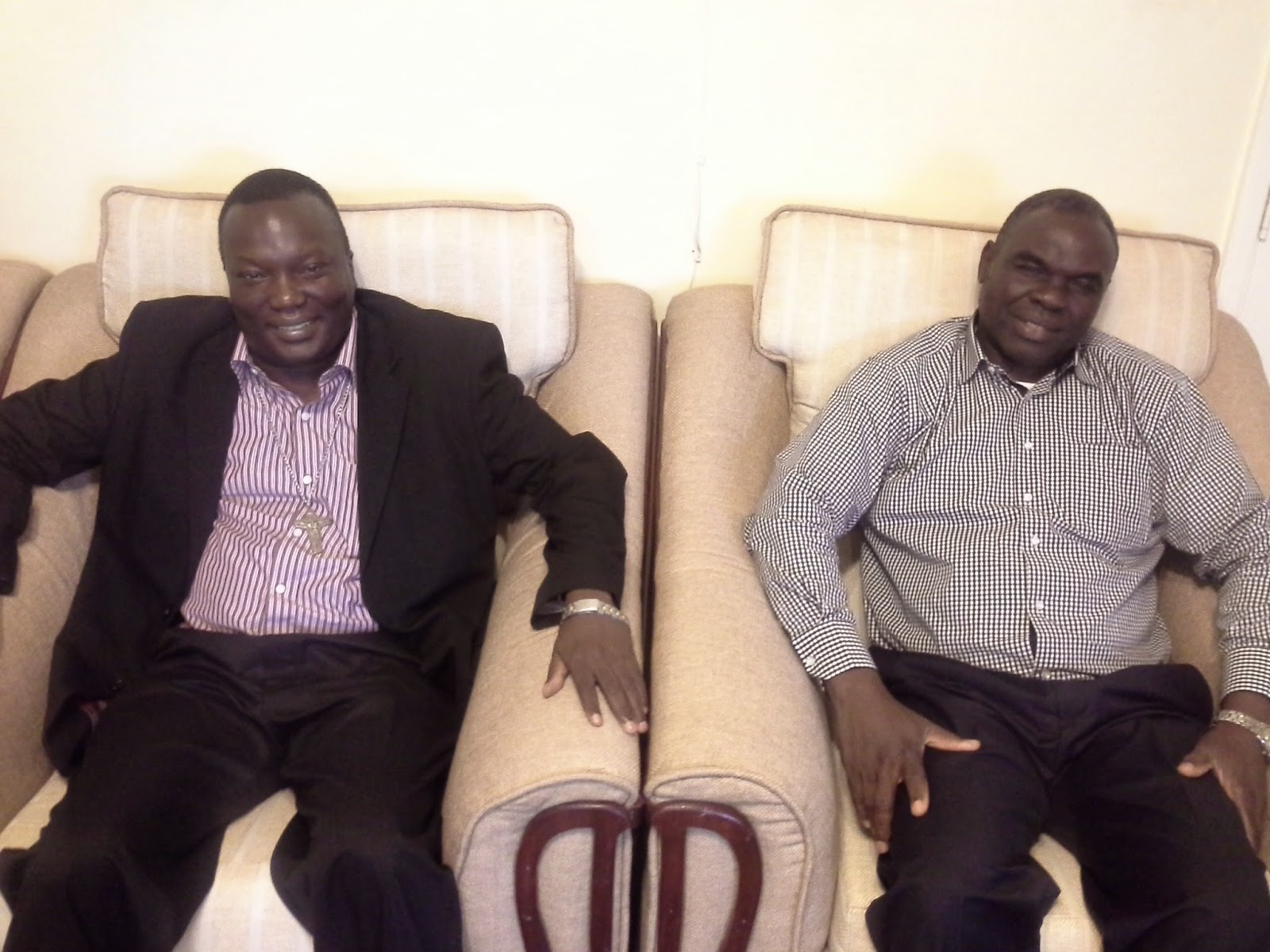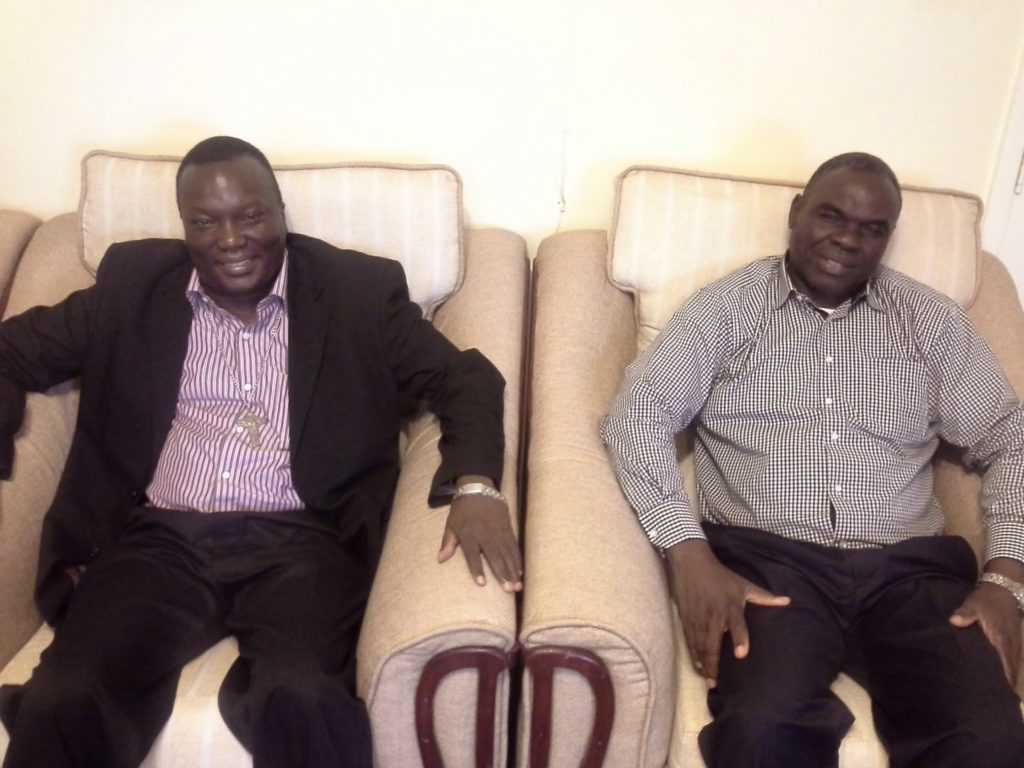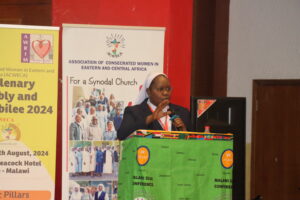AMECEA: Diocese of Malakal prepares for the Resumption of Pastoral Activities; Appeal for Assistance

 |
| Msgr. Roko Taban (left) Apostolic Administrator of Malakal with Fr. Santino Mokoromomo, former Secretary General SCBC at AMECEA Secretariat in Nairobi |
When listening
to the horror stories of what happened in the town of Malakal, it would be
unthinkable to imagine someone who went through the ordeal going back there. Not
so with the Priests from the Diocese of Malakal, as
narrated by the Apostolic Administrator of the Diocese Msgr. Roko Taban Mousa.
Msgr. Roko who
visited AMECEA Secretariat in Nairobi, together
with the former Sudan Catholic Bishop Conference (SCBC) Secretary General, Rev
Santino Mokoromomo on 22nd May, said that despite of all that is currently
happening in South Sudan, there are two parishes that are still operating
normally. These include Olfangak, which has three Comboni Missionaries and Ayot
which has two Missionary Priests.
visited AMECEA Secretariat in Nairobi, together
with the former Sudan Catholic Bishop Conference (SCBC) Secretary General, Rev
Santino Mokoromomo on 22nd May, said that despite of all that is currently
happening in South Sudan, there are two parishes that are still operating
normally. These include Olfangak, which has three Comboni Missionaries and Ayot
which has two Missionary Priests.
He said that
some Priests who ran away from their parishes during the time of violence still
find time to go back and join their people in their suffering and celebrate
Mass for them despite the risks that are involved. “Just for an example during
Holy Week, some Priests took courage to go back to celebrate Mass with their
people; however, they couldn’t stay for long because Parishes were still the major targets
for the rebels,” he said adding that “When they got back they gave us a report
that there was nothing left in their parish houses; but the people were
generous enough for that they provided them with food and accommodation. Still the priests said it was not safe to go back.”
some Priests who ran away from their parishes during the time of violence still
find time to go back and join their people in their suffering and celebrate
Mass for them despite the risks that are involved. “Just for an example during
Holy Week, some Priests took courage to go back to celebrate Mass with their
people; however, they couldn’t stay for long because Parishes were still the major targets
for the rebels,” he said adding that “When they got back they gave us a report
that there was nothing left in their parish houses; but the people were
generous enough for that they provided them with food and accommodation. Still the priests said it was not safe to go back.”
He said that
generally the Diocese is operating from Juba where they have a small liaison
office, from where they coordinate some activities of the diocese in
collaboration with some catechists who are in the villages with the people.
generally the Diocese is operating from Juba where they have a small liaison
office, from where they coordinate some activities of the diocese in
collaboration with some catechists who are in the villages with the people.
Msgr. Roko Taban
Mousa, was full of pain and sorrow as he recounted what had happened to his
diocese that led to the closure of the Cathedral and subsequent their escape
for their dear lives to Juba. He could not hide his disappointment at the fact
that the evil power struggle that has generated so much suffering to the
ordinary people of South Sudan is yet to come to an end.
Mousa, was full of pain and sorrow as he recounted what had happened to his
diocese that led to the closure of the Cathedral and subsequent their escape
for their dear lives to Juba. He could not hide his disappointment at the fact
that the evil power struggle that has generated so much suffering to the
ordinary people of South Sudan is yet to come to an end.
He
said that they were putting into place the preparatory measure that
would help them resume its normal operation of their Diocese-Malakal once peace
is attained. He said one of such measures is that of sending the Priests for
counseling and trauma healing course. “Already the Diocese has managed to send
six Priests to Kenya for a three-month course on counseling, trauma healing and
health care,” he said adding that “I hope to send more Priests and if possible
all the priests in the diocese, (twenty eight (28) Priests) which include18
Diocesan and 10 Missionary Priests.”
said that they were putting into place the preparatory measure that
would help them resume its normal operation of their Diocese-Malakal once peace
is attained. He said one of such measures is that of sending the Priests for
counseling and trauma healing course. “Already the Diocese has managed to send
six Priests to Kenya for a three-month course on counseling, trauma healing and
health care,” he said adding that “I hope to send more Priests and if possible
all the priests in the diocese, (twenty eight (28) Priests) which include18
Diocesan and 10 Missionary Priests.”
Msgr. Roko is
appealing passionately to AMECEA member countries, International partners and other
people of Good will for support that will enable the Priests affected undergo counseling and
trauma healing course in Nairobi, Kenya. The support would cover the travel
expenses to Nairobi, accommodation and fees for the course.
appealing passionately to AMECEA member countries, International partners and other
people of Good will for support that will enable the Priests affected undergo counseling and
trauma healing course in Nairobi, Kenya. The support would cover the travel
expenses to Nairobi, accommodation and fees for the course.
When AMECEA Online News wanted to know
exactly what happened, Msgr. Roko Taban again recounted the painful events that
culminated to the deaths of so many people in Malakal which according to him is
the largestdiocese geographically in South Sudan and also the most populatedof
all.
exactly what happened, Msgr. Roko Taban again recounted the painful events that
culminated to the deaths of so many people in Malakal which according to him is
the largestdiocese geographically in South Sudan and also the most populatedof
all.
“The war
spread very fast because when you don’t have a proper national army, you can
easily have defections from the national army to the rebels’ faction and this
is what exactly happened in Jonglei, and Unity States,” said Msgr. Taban adding
that ‘When there is heavy use of military machinery, you expect many civilians
to die, whether targeted or not targeted, the bullets will never differentiate.”
spread very fast because when you don’t have a proper national army, you can
easily have defections from the national army to the rebels’ faction and this
is what exactly happened in Jonglei, and Unity States,” said Msgr. Taban adding
that ‘When there is heavy use of military machinery, you expect many civilians
to die, whether targeted or not targeted, the bullets will never differentiate.”
He said that
what was terrible about the conflict was the indiscriminative looting; “My
house was looted while I was there watching and there was nothing I could do
about it, they then asked me to move to the Cathedral and I had to oblige,” he
said.
what was terrible about the conflict was the indiscriminative looting; “My
house was looted while I was there watching and there was nothing I could do
about it, they then asked me to move to the Cathedral and I had to oblige,” he
said.
“When the
army came and took over the town of Malakal from the rebels, we thought that
that was the end of the anarchy that started since December but, that did not
last long, the rebels came again and there was a terrible fight. Many people
lost their lives; even in the hospital where some people had taken refuge, it
was safe. The government army rescued again the town for the second time, but
shortly afterwards the rebels took control of the town for the third time and
that was the worst attack,” Msgr. Roko Taban recounted.
army came and took over the town of Malakal from the rebels, we thought that
that was the end of the anarchy that started since December but, that did not
last long, the rebels came again and there was a terrible fight. Many people
lost their lives; even in the hospital where some people had taken refuge, it
was safe. The government army rescued again the town for the second time, but
shortly afterwards the rebels took control of the town for the third time and
that was the worst attack,” Msgr. Roko Taban recounted.
Msgr. Roko Taban
said that during the third attack in Malakal town, the rebels had become more
aggressive and they could not see any sense of humanity in anybody. There was
killing and slaughtering of people everywhere and dead bodies lied everywhere
on the streets in town; “I remember when I was going to the airport to come to
Juba for the conference, I had to go and fly by the UNIMISS flight because that
was the only means out of the town -Malakal. I had to use an ambulance to cross
the town because you couldn’t go by ordinary car and risk being shot at,” he
said.
said that during the third attack in Malakal town, the rebels had become more
aggressive and they could not see any sense of humanity in anybody. There was
killing and slaughtering of people everywhere and dead bodies lied everywhere
on the streets in town; “I remember when I was going to the airport to come to
Juba for the conference, I had to go and fly by the UNIMISS flight because that
was the only means out of the town -Malakal. I had to use an ambulance to cross
the town because you couldn’t go by ordinary car and risk being shot at,” he
said.
“It was not
an easy thing; it was a very painful scene that we had to experience as a
Priest and administrator of Malakal,” he said adding that “Seeing people being
butchered like animals; watching innocent people being tortured to death,
seeing innocent children not spared and helpless women and the elderly begging
for mercy yet nobody spares them is quite painful.”
an easy thing; it was a very painful scene that we had to experience as a
Priest and administrator of Malakal,” he said adding that “Seeing people being
butchered like animals; watching innocent people being tortured to death,
seeing innocent children not spared and helpless women and the elderly begging
for mercy yet nobody spares them is quite painful.”
He said that
he thought that he could do something to protect the people but he knew that he
was vulnerable on the hands of the rebels. “It was indeed an experience that
nobody would want to recall,” he said.
he thought that he could do something to protect the people but he knew that he
was vulnerable on the hands of the rebels. “It was indeed an experience that
nobody would want to recall,” he said.
Msgr. Roko
Taban believes that reconciliation is possible because people of South Sudan do
not want to go back that period of civil they experienced for 21 years. He pointed out that the greatest need for the
people of South Sudan is national healing and reconciliation.
Taban believes that reconciliation is possible because people of South Sudan do
not want to go back that period of civil they experienced for 21 years. He pointed out that the greatest need for the
people of South Sudan is national healing and reconciliation.
Source: AMECEA Social
Communications
Communications


